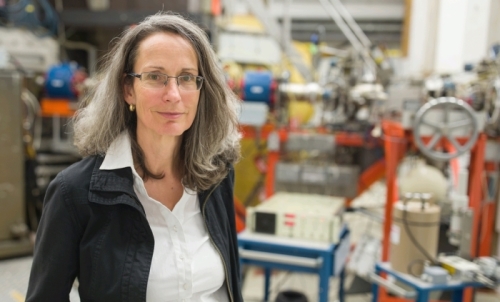Andrea Denker is Professor of "Accelerator Physics for Medicine"

Prof. Dr. Andrea Denker is the head of the department "Proton Therapy" at HZB. © HZB/ M. Setzpfandt
The Beuth Hochschule für Technik Berlin and the Helmholtz-Zentrum Berlin (HZB) have appointed Prof. Dr. Andrea Denker to the joint professorship "Accelerator Physics for Medicine" as of October 1, 2018. Since 2006, Andrea Denker is head of the department "Proton Therapy" at the HZB, which operates the accelerator for eye tumor therapy. The therapy, offered in cooperation with the Charité - Universitätsmedizin Berlin and the HZB, is unique in Germany.
As part of her professorship, Andrea Denker is taking on lectures in the "Physical Technology - Medical Physics" course at Beuth University. In the current winter semester she offers the lecture "Atomic and Nuclear Physics" for Bachelor students.
Even before her appointment, Andrea Denker was a lecturer at the university. "I enjoy this job very much and the contact with the students is very enriching for me and my team at HZB," says Denker. The appointment now creates an even closer connection to the university. "We are already looking forward to many interesting theses that will be written at the proton accelerator at the HZB.
Andrea Denker studied and received her doctorate in physics at the University of Stuttgart. Then she worked at the CSNSM (Centre de Sciences Nucléaires et de Sciences de la Matière) in Orsay, France. In 1995 Andrea Denker started as a scientist at the ion accelerator ISL. Among other things, she calculated and developed the beam parameters for eye tumor therapy, which was launched 20 years ago.
(sz)
https://www.helmholtz-berlin.de/pubbin/news_seite?nid=14955;sprache=en
- Copy link
-
The twisted nanotubes that tell a story
In collaboration with scientists in Germany, EPFL researchers have demonstrated that the spiral geometry of tiny, twisted magnetic tubes can be leveraged to transmit data based on quasiparticles called magnons, rather than electrons.
-
Bright prospects for tin perovskite solar cells
Perovskite solar cells are widely regarded as the next generation photovoltaic technology. However, they are not yet stable enough in the long term for widespread commercial use. One reason for this is migrating ions, which cause degradation of the semiconducting material over time. A team from HZB and the University of Potsdam has now investigated the ion density in four different, widely used perovskite compounds and discovered significant differences. Tin perovskite semiconductors produced with an alternative solvent had a particular low ion density — only one tenth that of lead perovskite semiconductors. This suggests that tin-based perovskites could be used to make solar cells that are not only really environmentally friendly but also very stable.
-
Synchrotron radiation sources: toolboxes for quantum technologies
Synchrotron radiation sources generate highly brilliant light pulses, ranging from infrared to hard X-rays, which can be used to gain deep insights into complex materials. An international team has now published an overview on synchrotron methods for the further development of quantum materials and technologies in the journal Advanced Functional Materials: Using concrete examples, they show how these unique tools can help to unlock the potential of quantum technologies such as quantum computing, overcome production barriers and pave the way for future breakthroughs.
